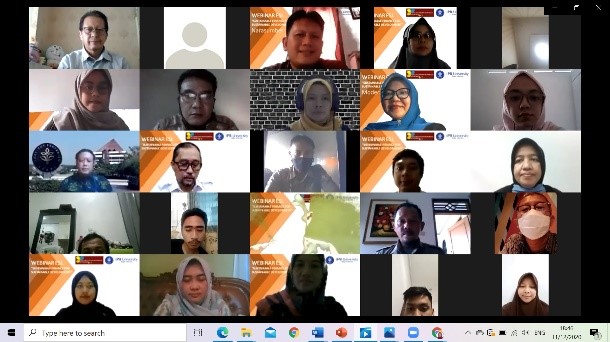Discussion about Sustainable Finance for Sustainable Development at ESL IPB University
Discussion about Sustainable Finance for Sustainable Development at ESL IPB University
 Sustainable Finance For Sustainable Development is a financial concept for sustainable development with concern environmental aspects. This concept inevitably has to be implemented in Indonesia. If Indonesia isn’t caring, the impact of climate change can cost up to 2.5-7 percent of Gross Domestic Product (GDP) each year. Besides, Indonesia is an archipelagic country that is prone to disasters, so that development without caring for the environment will cause Indonesia to bear higher economic losses.
Sustainable Finance For Sustainable Development is a financial concept for sustainable development with concern environmental aspects. This concept inevitably has to be implemented in Indonesia. If Indonesia isn’t caring, the impact of climate change can cost up to 2.5-7 percent of Gross Domestic Product (GDP) each year. Besides, Indonesia is an archipelagic country that is prone to disasters, so that development without caring for the environment will cause Indonesia to bear higher economic losses.
This was conveyed by Rahajeng Pratiwi, MBA, from The International Finance Corporation (IFC), Program Coordinator of Sustainable finance in the Sustainable Finance for Sustainable Development Webinar held by the Resource and Environmental Economics Study Program, Faculty of Economics and Management (FEM) IPB University, ( 8/12).
According to her, Indonesia is a disaster supermarket. Year by year, the frequency of disasters continues to increase. The poor communities or economic groups that depend on climate and sensitive livelihoods will get the biggest impact, such as agriculture, fisheries, and forest activities.
“The losses in 10 years will reach 15 to 20 trillion rupiah. For that, there must be sustainable finance. The impact of the disaster will affect water security, such as scarce clean water, damage to land ecosystems, marine ecosystems, and food security. Realizing the high risk of loss, Indonesia must commit to tackling climate change by reducing the risk of greenhouse gases by 20 percent, ” she said.
Not only that, more hard challenge for Indonesia is facing the infrastructure gap. So that sustainable development financing can pursue growth targets and achieve a reduction of Green House Gas (GHG) emissions and Sustainable Development Goals (SDGs) by 2030.
“There is an opportunity for climate investment to entering Indonesia amount US $ 458 billion between 2016-2030. It creates significant opportunities to generate renewable energy, improve environmentally friendly development and sustainable development, ” she added.
Meanwhile, Dr. A Faroby Falatehan as Chair of the Environmental and Resource Economics Study Program of the Postgraduate School of IPB University, said that in the implementation of sustainable finance in Indonesia, the Financial Services Authority (OJK) has stated the rules in OJK Regulation (POJK) Number 51 of 2017 concerning Action Plans Sustainable Finance and POJK number 60 of 2017 concerning the Issuance and Requirements for Elek with an Environmentally Friendly Debt.
“OJK tries to successfully implement the Sustainable Finance Program to support the government’s commitment to reduce greenhouse gas emissions according to the agreement of the G20 countries,” he added.
According to him, eight banks provide credit based on the principle of sustainable financing. Namely PT Bank Mandiri, PT Bank Negara Indonesia (BNI), PT Bank Rakyat Indonesia (BRI), PT Bank Central Asia (BCA), PT Bank Artha Graha Internasional, PT Bank Muamalat Indonesia, PT Bank BRI Syariah, and PT Bank Pembangunan Daerah Jawa Barat dan Banten. These banks have worked on several sustainable finance projects such as renewable energy, energy efficiency, sustainable agriculture, green building and infrastructures, the recycling industry, and eco-tourism. (IAAS/ASH)


